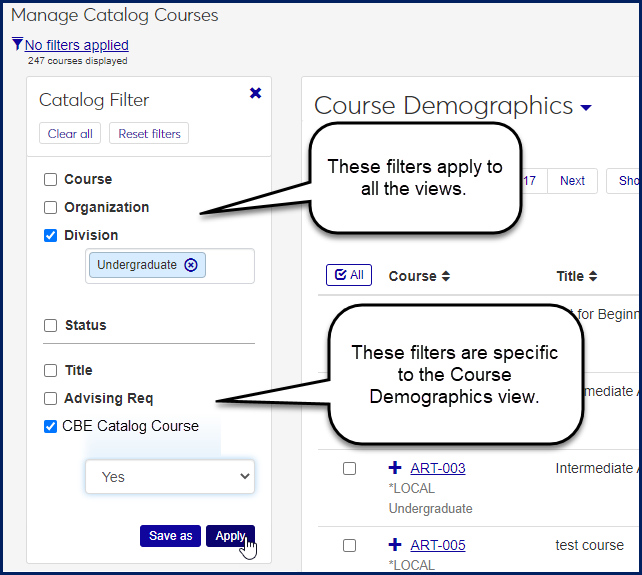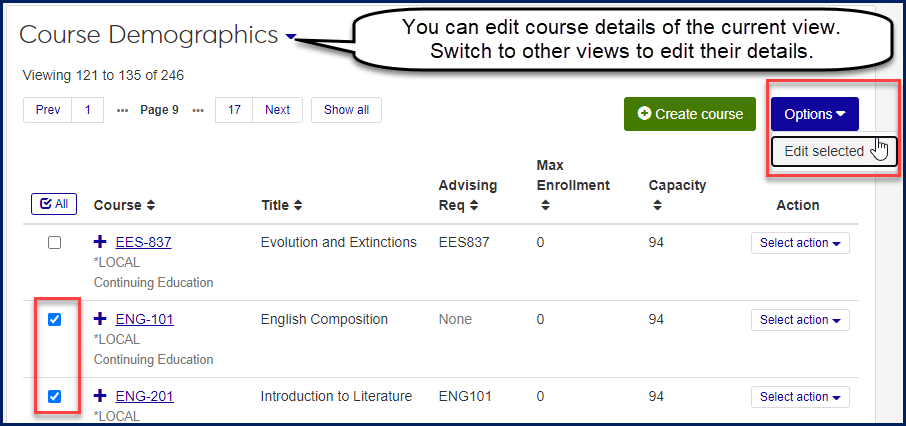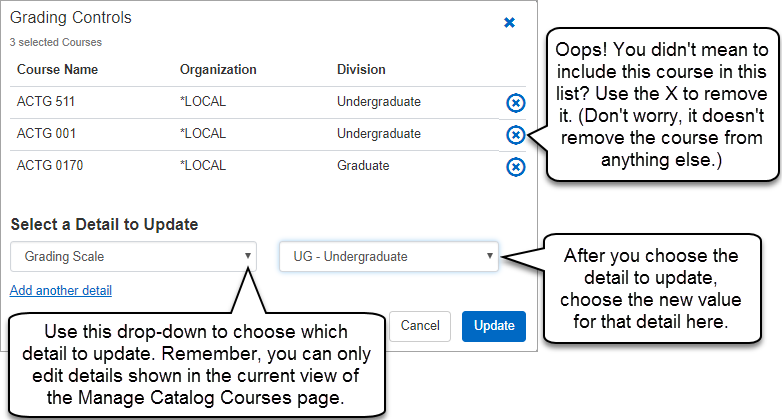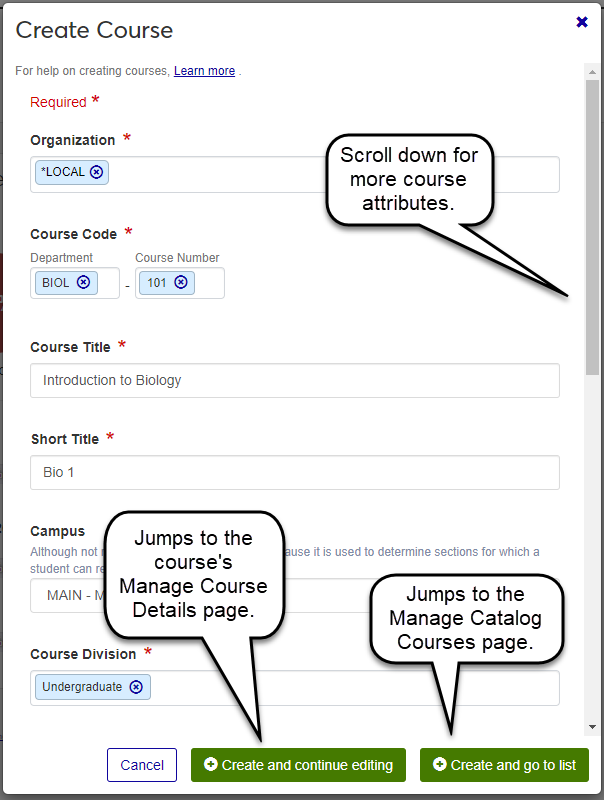Manage Catalog Courses
Important
Information and features vary according to the roles to which you belong and the permissions associated with those roles. For more information, contact your module manager or your campus support team.
This page provides powerful tools to create, edit, and manage courses in your course catalog. The information is grouped in table views which you select in a drop-down on the page title. Use filters to find courses that meet your search phrases.
Use the filters to narrow down the list of courses. The fields in the top half of the filter apply to all views. The lower fields are specific to the selected view.
The Manage Catalog Courses page shows information related to each course, including enrollment, capacity, grading settings, credit hours, and more. To see all the information available on this page, use the view drop-down in the table title to switch between views.
Tip
For more information on each of these details, see Manage Course Details. Detailed descriptions of each field are also found in the Online Help for J1 Desktop - Catalog window.
The Course Demographics shows details that are also found on the Course Attributes and Course Description tabs of the Catalog window in J1 Desktop. You can view and edit* the following details:
Important
*Ability to edit details depends on the permissions assigned to you. Contact your module manager or campus support team for more information.
Course Title, Organization, and Course Division
Advising Requirements
Maximum Enrollment
Capacity
Clicking the + icon beside any course row will show the following information for that course:
Short title
Institutional Division
Location
School Code
Tuition Code
Refund Code
Program Category
Flexibility Scheduled
Exclude Course from Census Date Reporting
Exclude Course from Checkpoint Reporting
Course Reminder
Status
Date Inactive (if applicable)
Date Approved
The Grading Controls tab is similar to the Grading subtab on Courses window | Course tab of J1 Desktop, and allows you to view or edit* these section details:
Important
*Ability to edit details depends on the permissions assigned to you. Contact your module manager or campus support team for more information.
Course Title, Organization, and Course Division
Grading Periods
Grading Type
Clicking the + icon beside any course row will show the following information for that course:
Variable Grading Type
Grading Period
Status
Date Inactive
Portal Controls includes settings for how the course will be displayed and available for students to see in the Campus Portal. The Portal Controls tab is similar to the Course tab | Web subtab on the Courses window of J1 Desktop and allows you to view and edit* these section details:
Important
*Ability to edit details depends on the permissions assigned to you. Contact your module manager or campus support team for more information.
Course title, Organization, and Course Division
Catalog Text
Clicking the + icon beside any course row will show the following information for that course:
Must Pay
Public Registration
Course Authorization Requirement
Status
Date Inactive
The Hours view shows settings and details related to the clock and credit hours assigned to this course. The Hours view is similar to the Credits section of the Courses window of J1 Desktop and allows you to view and edit* these section details:
Important
*Ability to edit details depends on the permissions assigned to you. Contact your module manager or campus support team for more information.
Course title, Organization, and Course Division
Credits
Course Repeatable
Clicking the + icon beside any course row will show the following information for that course:
Lecture Credits
Lab Credits
Lecture / Lab Credits
Clock Hours Variable / Fixed
Clock Hours
Min Clock Hours
Max Clock Hours
Lecture Clock Hours
Lab Clock Hours
Load Contact Hours
Lecture / Lab in One Course
Number of Weeks Course Meets
Status
Date Inactive
Default Allow Open Entry
Default Allow Open / Early Exit
Method to Set Census Date and Last Student Withdrawal Date (for Open Enrollment courses)
Each selection displays pertinent columns.
By date
By number of days
Census (days after start date)
Last Student Withdrawal (days after start date)
By percentage
Census (% from start date to end date)
Last Student Withdrawal (% from start date to end date)
When a student registers for the section, we use this method to calculate the individual student's Census Date and Last Student Withdrawal Date. The dates appear in the student course records such as on the section's Manage Student Section Details page.
Begin Date: the day the student registers
End Date
Census Date: calculated according to the method selected above
Last Student Withdrawal Date: calculated according to the method selected above.
Default Registration Cutoff: Days before End of Term
Default Max Days Duration
Use this view to manage reporting options for the catalog course. The options may be pertinent to your school's state reports.
These are the fields available:
Course: Includes Course Code, Organization (such as *LOCAL or other institution), and Division
State Type: Select an option from the drop-down. Defined on the Maintain Table Values page, Column Name: crs_state_type (Course State Type).
Type of Instruction: Select an option from the drop-down. Defined on the Maintain Table Values page, Column Name: crs_instrtn_method (Course Instruction Method).
State Funded: Yes or No
Taught in District: Yes or No
Dual Enrollment: Yes or No
Interinstitutional: Yes or No
Self-Paced or Intervention: Yes or No
ESOL: Yes or No
Developmental: Yes or No
Performance-Based Education: Yes or No
Tip
Performance-Based Education courses are a type of Developmental Course, so if you're looking for Performance-Based Education courses, make sure Developmental Course in the Catalog Filter doesn't have No selected.
Education Success Type / Level: Shows the Manage associations button (with a count of associations). Clicking the button opens the Manage Education Success Associations pop-up. There you can view, add, or remove associations. An association is an Education Success Type paired with an Education Success Level.
State Articulation Elements 1: Select a Department Code and a Course Number from the drop-downs. Defined on the Maintain Table Values page, Column Name crs_articulation_dept_1 (Course Articulation Department Code 1).
State Articulation Elements 2: Select a Department Code and a Course Number from the drop-downs. Defined on the Maintain Table Values page, Column Name crs_articulation_dept_2 (Course Articulation Department Code 2).
Course Level: Select from the drop-down. Defined on the Maintain Table Values page, Column Name crs_level (Course Articulation Course Level).
Eligible for Subsidy: Yes or No
Use this view to see Competency Based Education information for courses. You can use filters to limit the list to courses designated as CBE courses, or even to courses with particular competencies assigned.
Tip
This view may have a different name. The Display Name for Competency Based Education is "CBE" by default, but your school can change it on the Competency Based Education (CBE) Settings page. The Display Name shows in window names, drop-downs, and buttons. In documentation, we call it "CBE".
Each CBE element assigned to the course is listed. The status (Active or Inactive) and the Date Inactive (if any) also show. To edit the details, click the Manage CBE details button. The Manage CBE Details grid pops up, and you can edit some of the details. For more editing options, including adding and removing competencies, select Manage course details in the Actions drop-down.
The blue Options drop-down menu allows you to apply a specific action to all rows that are selected. For the Manage Catalog Courses page, the option available is Edit selected. Choosing this option with one or more rows selected allows you to choose a detail to update for all selected rows.
Caution
The details that may be edited using the Options | Edit selected is limited to the details shown on that view. For example, on the Grading Controls view, you will only have the option to update Variable Grading Type or Grading Scale.
Tip
As long as you are not editing more than 200 rows at a time, the Edit Details pop-up shows the courses that will be affected by this update. You can use the X icon beside each course to remove any course that you don't want to include in this update, if you accidentally grabbed the wrong one.
The Options drop-down also has the Download to Excel option.
The Actions drop-down performs the selected action on that row only. On the Manage Catalog Courses window, the choices in this drop-down are:
Manage course details - Takes you to the Manage Course Details page
Delete - Permanently removes this course from the course catalog.
Danger
This action cannot be undone.
Manage variable grading types - opens a pop-up window that allows you to selected one or more variable grading types to associate with this course. This action is available only on the Grading Controls view of the Manage Catalog Courses page (and only if you have turned on Variable Grading Types for this course).
To edit details about a course, you can use the Edit option on the Manage Catalog Courses page, or you can use Manage Course Details, available in the Hub options drop-down on the summary page for the course you want to edit.
On the Reporting view, each catalog course is a row in the list. Click the Expand
 button to show all the fields for a course.
button to show all the fields for a course. To edit fields for one or more courses:
Select the checkbox for the courses.
In the Options drop-down, select Edit selected. In the pop-up, select a detail to update in the left-side drop-down, and select a value for it in the right-side drop-down.
To edit another field, click Add another detail.
To save your changes, click Update.
To manage the Education Success level and type:
Click the Manage associations button. The Manage Education Success Associations pop-up opens.
To remove an associated Education Success Type and Level, click the Remove button
 .
.To add an association, click Add another association. Select a Type and a Level from the drop-downs.
To save your changes, click Update.
On the CBE view, on a course's row, click the Manage CBE Details button.
On the pop-up, select or enter information as needed. If the information doesn't change, the field isn't editable.
Click the Save button.
Tip
You can also edit CBE details on the Manage Course Details window's CBE view. There, you can also add and remove CBE elements.
Turn On Variable Grading Types at Course Level
Note
If variable grading types are added to the course, then any new sections created based on that course will adopt the grading types. Variable grading types can also be added, removed, or changed at the section level.
First, make sure that you have turned Variable Grading Types on for the catalog course.
On the Manage Catalog Courses page, on the Grading Controls table view, select the checkbox on the left side.
Click the Options button.
From the Options drop-down, choose Edit Selected.
In the Grading Controls pop-up, choose Variable Grading Type.
Select Yes in the drop-down on the right.
Click Update.
Navigate to the Manage Catalog Courses page, on the Grading Controls table view.
On the row for the course you are working with, click the Select action button.
In the drop-down menu, choose Manage variable grading types.
In the Manage Variable Grading Types popup, add or remove variable grading types.
Click Update to save your edits.
Select the checkboxes next to the rows you want to export.
From the Options drop-down, select Download to Excel. The Download to Excel pop-up opens.
Select options for the Excel format and data columns.
Click Download. Your .xlsx or .zip file is saved in the file location that you have set in your browser settings.



